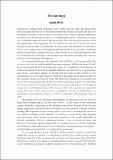Eschatology
Abstract
This chapter traces trends in nineteenth-century thought concerning eschatology and apocalypticism. Contrary to twentieth-century wisdom, eschatology was of central importance in nineteenth-century Christian consciousness and its philosophical inflections. Radical developments were seen in the doctrines of hell (whose eternal duration was increasingly questioned or rejected in favour of versions of apocatastasis) and the question of an imminent earthly messianic kingdom. Eschatological conceptions of history were secularized in Idealist and Romantic narratives of education and nationalist aspiration. In all these areas, the nineteenth-century eschatological consciousness was overwhelmingly one of continuity between earthly progress and transcendent continuation or fulfilment. This model of continuity began to be questioned in theology and biblical studies in the waning nineteenth century, and collapsed by the dawn of the First World War. Models of rupture now took its place, tendentiously projecting back onto the nineteenth century an ‘eschatological slumber’ from which only the twentieth century roused theology.
Citation
Wolfe , J 2019 , Eschatology . in J Rasmussen , J Wolfe & J Zachhuber (eds) , Oxford Handbook of Nineteenth-Century Christian Thought . Oxford Handbooks , Oxford University Press , Oxford , pp. 676-696 . https://doi.org/10.1093/oxfordhb/9780198718406.013.36
Publication
Oxford Handbook of Nineteenth-Century Christian Thought
Type
Book item
Collections
Items in the St Andrews Research Repository are protected by copyright, with all rights reserved, unless otherwise indicated.

